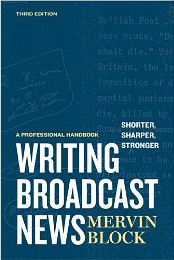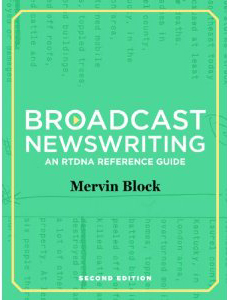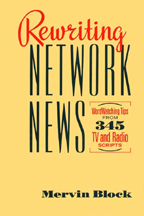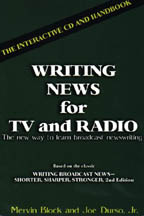When you listen to a network evening newscast, do you ever wonder how that word or that assertion got on the air? That happens to me almost every evening.
Let’s listen to a few scripts and see how they measure up. The anchor Lester Holt said on NBC’s “Nightly News” on Aug. 21, after stocks fell 530 points: “A major freefall on Wall Street.” Major freefall? Could the Street ever have a minor freefall?
Similarly, Holt said on Aug. 17: “Active duty troops mobilized as nearly a hundred major infernos burn homes to the ground, blazing to half a dozen states; money running dangerously low to fight them.” “Major infernos”? Have you ever heard of a minor inferno? The Merriam-Webster Dictionary defines inferno as “a very large and dangerous fire.” Inferno, in fact, is the Italian word for hell. Did those troops somehow mobilize themselves, as the script says, or were they mobilized by higher-ups? Did Holt mean the troops were mobilized? He went on to say: “One major factor fueling those unrelenting fires is, of course, the heat. Money running dangerously low to fight them.” One more major. But that incomplete sentence about money lacks a verb. “Blazing to half a dozen states”? I’ve never seen blaze used that way. Why not say simply, “The fires have spread to six states”? Later in the newscast, Holt said: “And a big announcement from ‘Saturday Night Live’ [an NBC show] today revealing [it’s hardly a Biblical revelation] Tracy Morgan will return to host an episode in October. It’s a major step forward as he recovers from a traumatic brain injury he suffered in a deadly highway crash in June of last year.” Still another major. Also: deadly means causing or capable of causing death. So the word to use there is fatal.
Another word that Holt favors is massive. His fondness for it might be called major. The American Heritage Dictionary defines massive as “Consisting of or making up a large mass; bulky, heavy, and solid.” But on Aug. 11, Holt said, “In Phoenix, a massive dust storm, known as a haboob, blew into the city….” On. Aug. 12, he said, “Overseas tonight, the death toll is rising after a pair of explosions delivered a massive one-two punch to the Chinese.” I’ve never heard of explosions that came in pairs. Shoes, gloves and tickets, yes. But explosions? Later in that broadcast, Holt said, “For the first time, the head of the E-P-A surveyed the damage unwittingly done by her own agency a week ago when it triggered a massive river contamination….” And on Aug. 19, Holt spoke of “massive sinkholes.” So, contrary to the meaning of massive, Holt spoke of a dust storm, explosions, pollution and sinkholes as massive. Yet none of them has any mass. Another word Holt likes is trigger, which he uses often to mean causes. Or touches off. Trigger is a word I never use unless I’m writing about Roy Rogers’ horse.
When it comes to the use of major, it’s hard to top David Muir, anchor of ABC’s “World News Tonight.” On Aug. 14, Muir said on “Good Morning America,” “Also right now, major explosions in that major Chinese city rocked by blazes that killed dozens and injured hundreds.” Two majors in one sentence! But barely 30 seconds later, he uncorked another major: “A major ABC News exclusive, actress Kelly Rutherford standing by….” Remember, where everything is major, nothing is major.
Muir and Holt are also big on using—and abusing—tonight. On Aug.17, Bloomberg moved a story about the comedian Tracy Morgan at 10 a.m. ET. But Muir and Holt both made it seem like a tonight story. Muir said, “Tonight, major new developments to tell you about in that deadly crash involving comedian Tracy Morgan.” Holt said, “There’s new information tonight about that deadly highway crash that left actor and comedian Tracy Morgan in a coma.”
A sharp-eyed, sharp-eared viewer, Andy Fisher, a former NBC News writer (and a friend of mine), called my attention to an ABC contradiction. On Aug. 13, Muir said at the top of his 6:30 p.m. newscast, “Two horrific accidents here at home [at home even for Hawaiians?] tonight, the school bus straight into a building….” In fact, the bus accident happened about 10 hours earlier. Shortly, Muir said, “Next tonight here to the video of a terrifying ride to school for children on a school bus today.” But then he reverted to his propensity to tonight just about any story he can—true or false. He said, “Eleven children on that bus have been rushed to the hospital tonight.” Tonight? Not so. Next, a correspondent, Gio Benitez, said: “Tonight, watch this startling video. That’s a school bus slamming right into a liquor store just after 8 A-M.” True.
Andy Fisher also told me Muir had tampered with the clock—again on Aug. 11: “The NTSB now releasing these images from inside Morgan’s limo,” Muir said, “those seats crumpled after being rammed by a Walmart truck. And what we’ve just learned about the truck driver, awake for 28 hours at the time of the crash.” Just learned? Reuters moved that news at 10:01 A-M, more than eight hours before Muir said he had just learned of the NTSB findings. Slow learner? Muir again (on Aug. 13): “The E-P-A now saying the water is safe. But tonight the agency facing possible lawsuits. And this new image, the governor of Colorado in last 24 hours drinking the water from the Animas River to prove it is safe.” The problem is the ing thing: saying, facing, drinking. Real writers not liking. Those aren’t verbs; they’re participles (words formed from verbs). And they’re certainly not conversational. People don’t talk that way, except for some anchor people and some wannabes. And then only on the air.
Two more of Muir’s errors: On Aug. 11, he said, “This week, we all saw the images of that parking lot on the one-year anniversary of Michael Brown’s death….” One-year anniversary is a no-no. Here’s what The Associated Press stylebook says: “Avoid first anniversary, the redundant one-year anniversary and terms such as six-month anniversary (or other time spans less than a year). Similarly, avoid first annual.” On “Good Morning America” of Aug. 14, Muir said, “I felt a little badly for her after that.” Should be bad, not badly. A person feels bad, which is an adjective. Badly is an adverb; a piano-tuner who injures his fingers feels badly. The grammarian Diane Hacker wrote that Clifton Fadiman once said, “Don’t feel bad when you hear the broadcaster say he feels badly. Just remember that all men are created equally.”
© Mervin Block 2015
S A L E !The Merv Block bookshelf on broadcast newswriting. |
 SALE SALE  |
 SALE SALE  |
|
|
S A L E !“Writing Broadcast News” and “Broadcast Newswriting: The RTDNA Reference Guide” “Rewriting Network News” and “Writing News for TV and Radio” All four of Block’s books about newswriting: $121—a saving of $30. Buy direct from the publisher, CQ Press. Or email: customerservice@cqpress.com Or call toll-free: 866-427-7737. |